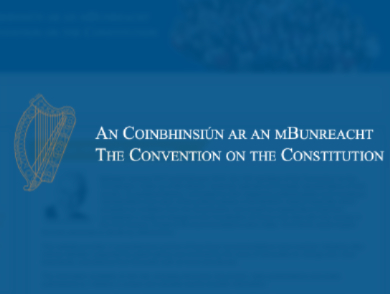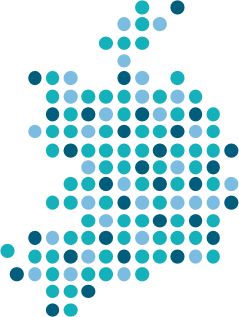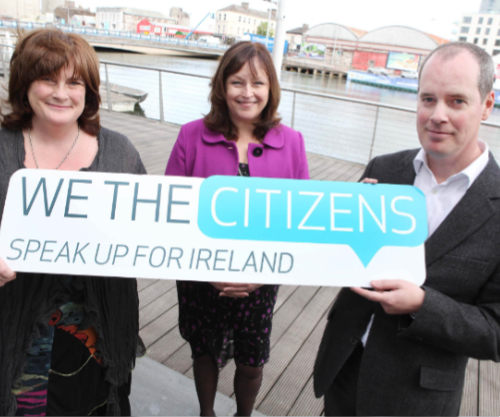
In late 2012 the Irish government established the Convention on the Constitution, which followed many of the procedures spearheaded by We The Citizens — with randomly selected citizen members at the core and following carefully facilitated and informed small group discussions. It met for 14 months between December 2012 and February 2014.
The membership of the Convention comprises 66 citizens selected randomly from the greater population by a market research company and 33 legislators from the Irish parlaiment nominated by their respective parties and including representatives from the political parties in the Northern Ireland Assembly. The 100th member was the chair, Tom Arnold, a respected individual from the charity sector. The Academic and Legal Support Group for the Convention was made up of David Farrell (research director), Jane Suiter (deputy research director), Clodagh Harris, Eoin O’Malley, and Lia O’Hegarty.
The Convention was tasked by the government with considering eight topics: the term of the Irish presidency; whether to reduce the voting age for citizens; electoral reform; the right for citizens outside the state to vote in presidential elections; marriage equality; the role of women in the Constitutional; the participation of women in politics and public life; and blasphemy. In addition, the Convention added to further items to its agenda: parliamentary reform and whether to insert a clause on economics, social and cultural rights into the Constitution.
In total the Convention made 43 recommendations, 18 of which would require constitutional amendment by a referendum. To date, there have been three referendums, two of which have been successful (on marriage equality in 2015 and blasphemy in 2018), and one unsuccessful (on reducing the age requirement of presidential candidates). There has also been extensive parliamentary reforms. Further reforms are promised or still being considered. The current state of play is summarised in the following table.
Assessing the ICC in terms of outcomes (as of January 2019)
| Topic |
ICC output |
Government reaction |
Action |
| 1. Reduction of presidential term |
3 recommendations |
Government accepted 2; rejected 1 |
Referendum defeated May 2015 |
| 2. Reduce voting age |
1 recommendation |
Government accepted this |
Referendum was promised for 2015; now promised within next 18 months (?) |
| 3. Role of women in home/public life |
2 recommendations |
Ministerial taskforce considered options. Government favoured simple removal of clause. |
Referendum likely in May 2019 |
| 4. Increasing women’s participation in politics |
3 recommendations |
Ministerial task force to investigate further |
No update |
| 5. Marriage equality |
2 recommendations |
Government agreed to referendum and to supporting legislation |
Referendum passed May 2015 |
| 6. Electoral system |
10 recommendations |
Government promised to establish an electoral commission and to task it with addressing 4 of the other recommendations; remaining 5 recommendations rejected |
Consultations ongoing about establishment of an Electoral Commission. |
| 7. Votes for emigrants/N. Ireland residents in presidential elections |
1 recommendation |
Ministerial task force considered options |
Referendum promised within next 18 months (?) |
| 8. Blasphemy |
2 recommendations |
Government agreed to principle of referendum |
Referendum passed October 2018 |
| 9. Dáil (parliamentary) reform |
12 recommendations |
No formal response from government |
The bulk of the recommendations were implemented in June 2016 |
| 10. Economic, social and cultural rights |
2 recommendations |
Government rejected this |
n/a |
The public submissions on these topics are available here: Link to public submissions
Video Links
In this brief video some of those involved in the Convention, as members, organisers or observers, reflect on its legacy.
Marriage Equality Video
Panel discussion on marriage equality
Presentations by advocates of a Yes vote
Presentations by advocates of a No vote
Presentations by experts
Blasphemy Video
Final Q&A on blasphemy
Agreeing a Ballot Paper




